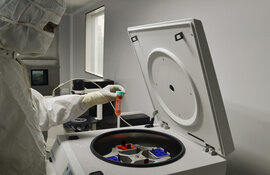AnaptysBio Inc. (ANAB:NASDAQ) announced positive results from the Phase 2 RENOIR trial evaluating its rosnilimab PD-1 depleter and agonist in rheumatoid arthritis, reported Wedbush Analyst Dr. Martin Fan in a June 4 research note. The biotech develops antibodies for inflammation and immunology.
The data showed "efficacy comparable to JAK (Janus kinase) inhibitors, deepening of response and no safety signals relative to placebo," Fan wrote.
70% Implied Upside
Wedbush maintained its $40 per share target price on this San Diego, Calif.-based life sciences company, trading at the time of Fan's report at about $23.52 per share, the analyst noted. The difference between these prices suggests a potential return of 70%.
AnaptysBio remains rated Outperform.
"Best Case" Efficacy Shown
In the RENOIR trial, three different doses of AnaptysBio's rosnilimab, a PD-1 agonist monoclonal antibody (mAb), plus a single placebo control arm were evaluated. At 14 weeks, all placebo patients were discontinued from treatment. All other patients had their level of disease activity assessed with the Clinical Disease Activity Index (CDAI). Those who did not achieve a score of 10 or less, indicating low disease activity, were discontinued from treatment, too.
At six months, the two highest dose cohorts had responses comparable to those with JAK inhibitors, among biologic and targeted synthetic DMARD-experienced patients. Of these patients, 49–56% achieved CDAI LDA, 42–44% achieved a 50% or greater response (ACR50) and 29–36% achieved a 70% or greater response (ACR70). Importantly, efficacy with rosnilimab was similar to efficacy with JAK inhibitors despite 29% of patients already having had JAK experience. This suggests rosnilimab could be an effective option for heavily refractory patients.
"Efficacy at six months represented a 'best case' scenario," Fan wrote.
Increased efficacy was reported among b/tsDMARD-naïve patients; 64% achieved pooled CDAI LDA, 60% achieved ACR50 and 48% achieved ACR70. Among patients who experienced CDAI LDA, responses remained durable through maintenance treatment, strengthening the validity of 14-week responses. Patients in this cohort sustained response even after treatment discontinuation, with 83% of responders at the end of treatment maintaining CDAI LDA response after two months.
The study also had patients report their outcomes via the Health Assessment Questionnaire Disability Index and the Visual Analogue Scale for measuring pain, and their input indicated deepening responses.
Differentiating Characteristics
Depletion of PD-1+ T-cells occurred to a greater extent with rosnilimab than the levels reported with Eli Lilly and Co.'s (LLY:NYSE) peresolimab, according to pharmacodynamic data analyses. This result supports the scientific rationale for best-in-class efficacy, wrote Fan.
Importantly, rosnilimab did not lower regulatory T-cell levels, suggesting that the chance of reduced efficacy is limited. Synovial biopsies showed about 90% reduction of PD-1+ T-cells in target tissue whereas Johnson & Johnson's (JNJ:NYSE) JNJ-4703 resulted in weak and inconsistent reduction of the same, according to a EULAR 2025 abstract.
Key Opinion Leaders' Take
Key opinion leaders told AnaptysBio what they see as the benefits of rosnilimab, Fan relayed. Among them are the reported efficacy at three and six months, responses being on par with historical benchmarks for JAK inhibitors, the separation from placebo as early as six to eight weeks and the potential for greater efficacy in a Phase 3 and beyond due to more lenient termination criteria. Given these characteristics, it is likely patients would prefer this drug and prescribers would use it.
Drug Safe and Well-Tolerated
Safety with rosnilimab was shown to be "very favorable," reported Fan, "which we view as supporting long-term use, differentiation among approved rheumatoid arthritis treatments." Occurrence rates of serious adverse events, infection and discontinuation were the same in the dosed cohort as in the placebo group. One patient suffered a stroke, but the key opinion leaders considered this event likely was unrelated to rosnilimab.
Indication No. 2: Ulcerative Colitis
Fan pointed out that the Phase 2 RENOIR results, in particular the JAK-like efficacy, durable responses and pharmacodynamic data, should have "positive readthrough" to the ongoing ROSETTA trial of rosnilimab in ulcerative colitis. Wedbush considers the ulcerative colitis program undervalued at current levels.
"In our view, ROSETTA has a high likelihood of clinical success, and we believe independent registrational development in ulcerative colitis is feasible with minimal/no dilution due to expected income from Jemperli royalties (an estimated $100 million-plus per year starting in 2030)," Fan wrote.
What to Watch For
Topline data from ROSETTA are expected in Q4/25, one of several upcoming potential stock-boosting events, noted Fan. Also, AnaptysBio is expected to present detailed RENOIR results at a medical conference this year, most likely, according to Fan, the 2025 American College of Rheumatology meeting.
Also this year, the biotech plans to announce its initial indication for its monoclonal antibody, ANB033, a CD122 antagonist.
"Considering limited after-market price action despite clinical validation of rosnilimab for rheumatoid arthritis, with readthrough for ulcerative colitis, we would be aggressive buyers ahead of the Q4/25 ulcerative colitis readout and continued Jemperli sales ramp," Fan wrote.
| Want to be the first to know about interesting Biotechnology / Pharmaceuticals investment ideas? Sign up to receive the FREE Streetwise Reports' newsletter. | Subscribe |





































